牛津译林版(2019)选择性必修第一册Unit 4 Exploring poetry Welcome to the unit & Reading 课件(共27张PPT)
文档属性
| 名称 | 牛津译林版(2019)选择性必修第一册Unit 4 Exploring poetry Welcome to the unit & Reading 课件(共27张PPT) | 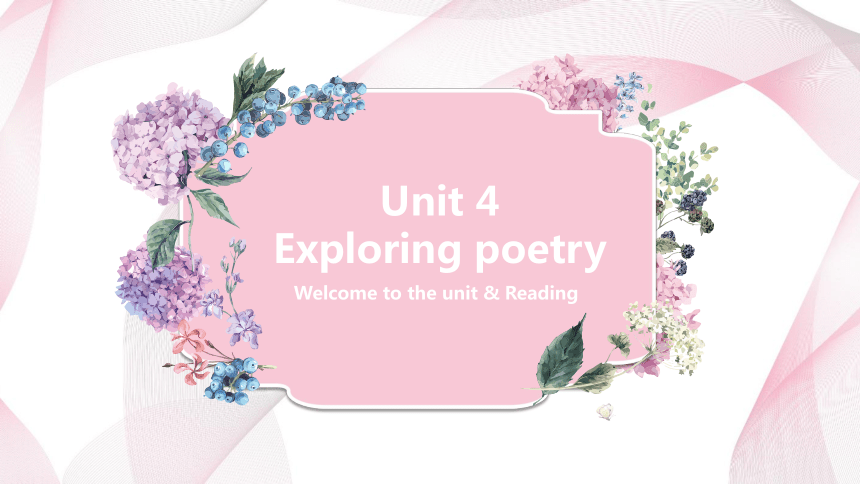 | |
| 格式 | pptx | ||
| 文件大小 | 2.5MB | ||
| 资源类型 | 教案 | ||
| 版本资源 | 牛津译林版(2019) | ||
| 科目 | 英语 | ||
| 更新时间 | 2023-08-26 13:33:29 | ||
图片预览

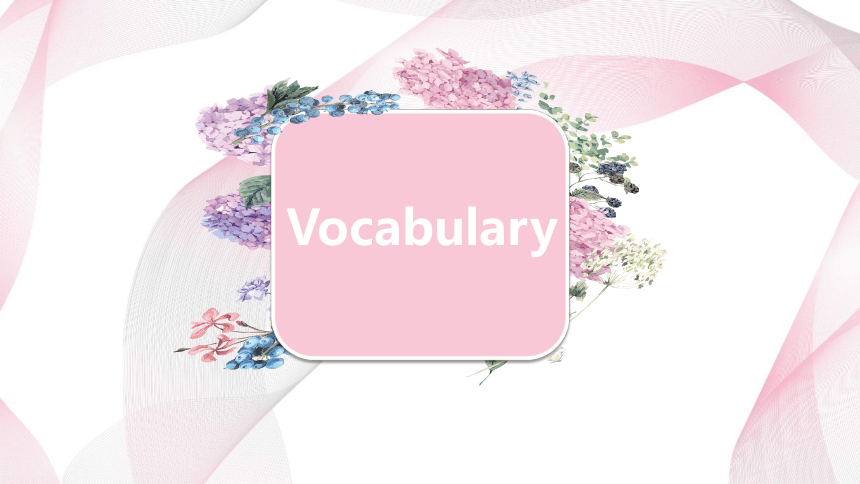
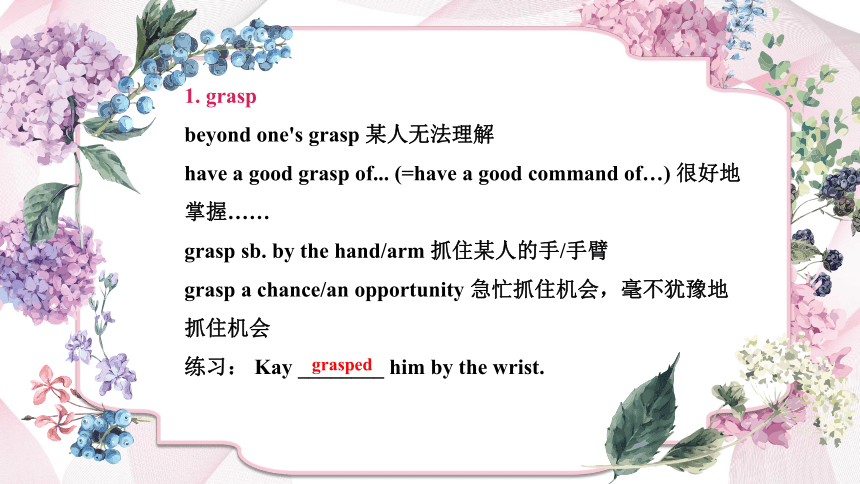
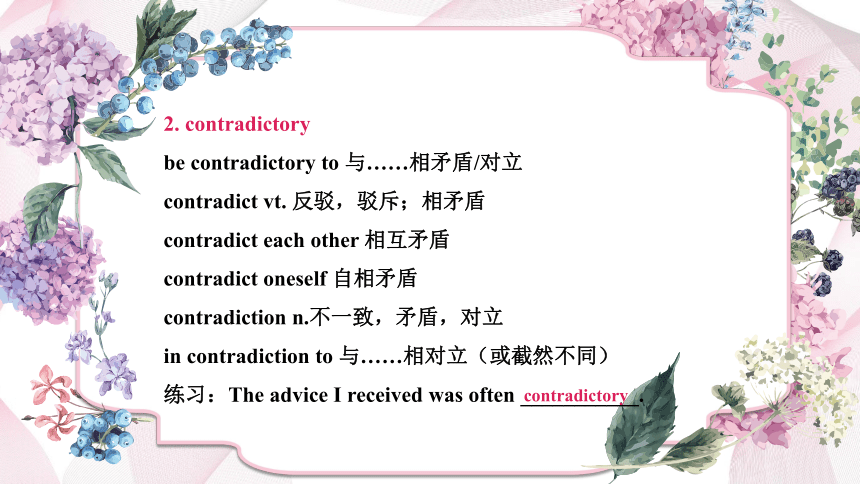
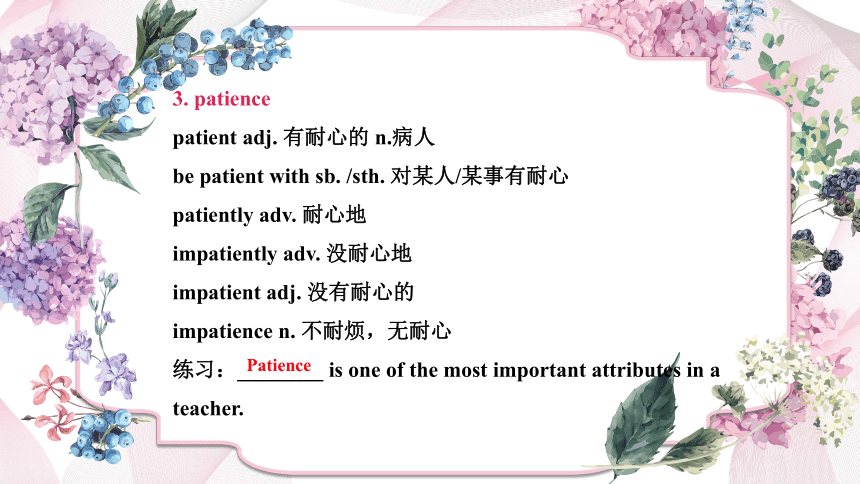
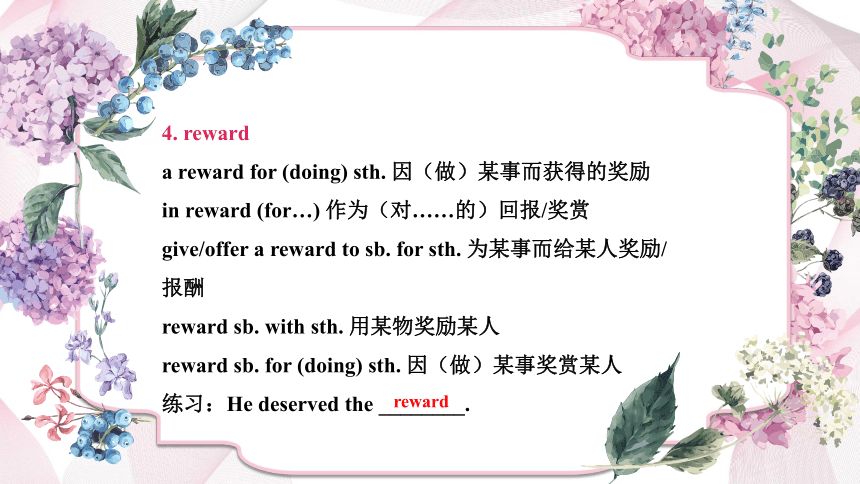


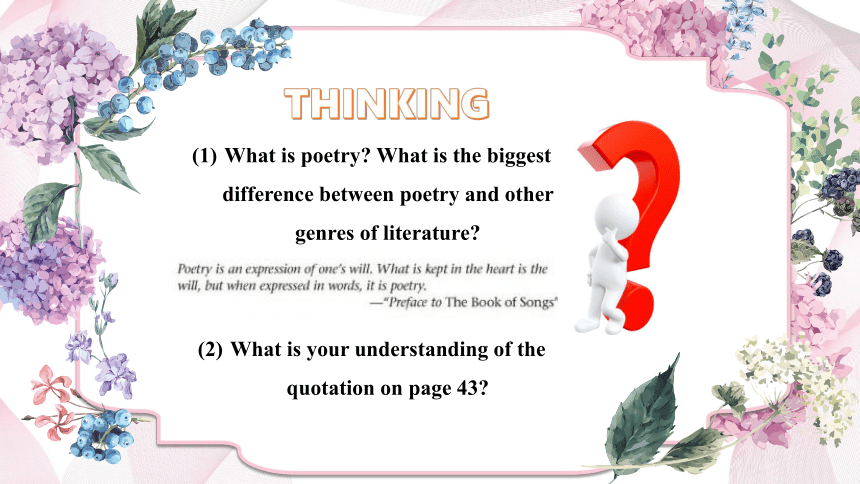
文档简介
(共27张PPT)
Unit 4
Exploring poetry
Welcome to the unit & Reading
Vocabulary
1. grasp
beyond one's grasp 某人无法理解
have a good grasp of... (=have a good command of…) 很好地掌握……
grasp sb. by the hand/arm 抓住某人的手/手臂
grasp a chance/an opportunity 急忙抓住机会,毫不犹豫地抓住机会
练习: Kay ________ him by the wrist.
grasped
2. contradictory
be contradictory to 与……相矛盾/对立
contradict vt. 反驳,驳斥;相矛盾
contradict each other 相互矛盾
contradict oneself 自相矛盾
contradiction n.不一致,矛盾,对立
in contradiction to 与……相对立(或截然不同)
练习:The advice I received was often ___________.
contradictory
3. patience
patient adj. 有耐心的 n.病人
be patient with sb. /sth. 对某人/某事有耐心
patiently adv. 耐心地
impatiently adv. 没耐心地
impatient adj. 没有耐心的
impatience n. 不耐烦,无耐心
练习:________ is one of the most important attributes in a teacher.
Patience
4. reward
a reward for (doing) sth. 因(做)某事而获得的奖励
in reward (for…) 作为(对……的)回报/奖赏
give/offer a reward to sb. for sth. 为某事而给某人奖励/报酬
reward sb. with sth. 用某物奖励某人
reward sb. for (doing) sth. 因(做)某事奖赏某人
练习:He deserved the ________.
reward
5. dig up
dig out 挖出
dig into sth 探究某事物
dig for sth 采某物,搜寻某物;挖掘某物
练习:If I have to, I'll __________ the garden and plant potatoes.
dig up
Reading
What is poetry What is the biggest difference between poetry and other genres of literature
What is your understanding of the quotation on page 43
THINKING
Are you interested in reading poems
Have you ever read any English poems
Have a talk and tell me your answer
Why do people read poems
Poems create vivid pictures and tell stories by using language creatively. Readers enjoy the challenge of trying to understand the poet's intention in writing a poem. A poem is a window into the poet's ideas and feelings about issues happening during the time when it was written. Readers can look at the poem's form and literary devices to see what the poet saw. By reading it aloud, they can feel the rhythms and rhymes of the poem as well as the poet's emotions.
What aspects of a poem do you pay attention to when you read it
I pay attention to a poem's form, its rhythm and rhyme, as well as the words used by the poet. The purpose of the poem is often shown by its form. For example, poets use extremely long forms for narrating stories. A poem's rhythm and rhyme help me understand the poet's feelings through sound. Word choice and literary devices enable me to understand the meaning of the poem better.
Sound
Sense
How does it sound
an explorer in an unfamiliar landscape
patient
fully understand a poem to appreciate it
More than other types of literature, it usually implies a deeper meaning beyond the words on the page.
The aspects of rhythm, repeated words, rhymes and other special effects.
Who is talking Who is being talked to What is being described Is there a sense of place
Are there other people or objects there
They are often less interesting than those that constantly reveal deeper and previously unrecognized meanings.
Sound
Sense
How does it sound
an explorer in an unfamiliar landscape
patient
fully understand a poem to appreciate it
1. Focus on Paragraph 2, read aloud the stanza from Sweet and Low. How does it sound
Firstly, the words "Wind of the western sea" are repeated.
Secondly, there are several rhyming words: "low" rhyming with "blow" and "go", "sea" rhyming with "me".
1. Focus on Paragraph 2, read aloud the stanza from Sweet and Low. How does it sound
Firstly, the words "Wind of the western sea" are repeated.
Secondly, there are several rhyming words: "low" rhyming with "blow" and "go", "sea" rhyming with "me".
2. Focus on Paragraph 3, read aloud the stanza from Caged Bird.
(1) What is being described
The poet is talking about a singing bird which is kept in a cage.
(2) What images come into your mind when reading it
When we read it, we see in our mind the images of a bird in a cage and a distant hill.
3. Read paragraphs 4 and 5 and answer the following questions.
(1) What should you do when you have difficulty in understanding a poem
When we have difficulty in understanding a poem, we should set it aside and come back to it later. With our insight into life becoming deeper, we may one day find it not so hard to understand at all.
(2) According to the lecturer, what is more important in appreciating a poem
Poetry reading can make us feel something or let us perceive another level of meaning, which is more important and worth our effort.
3. Read paragraphs 4 and 5 and answer the following questions.
(1) What should you do when you have difficulty in understanding a poem
When we have difficulty in understanding a poem, we should set it aside and come back to it later. With our insight into life becoming deeper, we may one day find it not so hard to understand at all.
(2) According to the lecturer, what is more important in appreciating a poem
Poetry reading can make us feel something or let us perceive another level of meaning, which is more important and worth our effort.
What are the functions of the three poems quoted in this transcript
2) Why doesn't the lecturer quote a poem as an example to support the fourth tip
THINKING
THINKING
Fill the blank
set aside
remote
rewarding
contradictory
Complex
interpreting
constantly
dig up
What does the author mean by "contradictory poems"
In some poems, the poet starts with one particular image, and then adds something that seems not to be in the correct place. These lines, which stick out, make the poems interesting.
Interpreting poetry can be difficult. Why does the author still enjoy it
Because it makes the author wonder-sometimes it is like a riddle to solve, or a question to answer.
THINKING
noun + verb-ing painstaking, heartbreaking, time-consuming, eye-catching
noun + verb-ed snow-covered, handmade, tongue-tied, sun-dried
noun + adjective lifelong, world-famous, homesick, duty-free
adverb + verb-ing everlasting, fast-flowing, bestselling, far-reaching
Finish B2
Finish B3
When I see the beautiful flowers
I can look at them for hours
My heart feels glad
And I stop feeling bad
I love their smell
And all is well
谢谢
Unit 4
Exploring poetry
Welcome to the unit & Reading
Vocabulary
1. grasp
beyond one's grasp 某人无法理解
have a good grasp of... (=have a good command of…) 很好地掌握……
grasp sb. by the hand/arm 抓住某人的手/手臂
grasp a chance/an opportunity 急忙抓住机会,毫不犹豫地抓住机会
练习: Kay ________ him by the wrist.
grasped
2. contradictory
be contradictory to 与……相矛盾/对立
contradict vt. 反驳,驳斥;相矛盾
contradict each other 相互矛盾
contradict oneself 自相矛盾
contradiction n.不一致,矛盾,对立
in contradiction to 与……相对立(或截然不同)
练习:The advice I received was often ___________.
contradictory
3. patience
patient adj. 有耐心的 n.病人
be patient with sb. /sth. 对某人/某事有耐心
patiently adv. 耐心地
impatiently adv. 没耐心地
impatient adj. 没有耐心的
impatience n. 不耐烦,无耐心
练习:________ is one of the most important attributes in a teacher.
Patience
4. reward
a reward for (doing) sth. 因(做)某事而获得的奖励
in reward (for…) 作为(对……的)回报/奖赏
give/offer a reward to sb. for sth. 为某事而给某人奖励/报酬
reward sb. with sth. 用某物奖励某人
reward sb. for (doing) sth. 因(做)某事奖赏某人
练习:He deserved the ________.
reward
5. dig up
dig out 挖出
dig into sth 探究某事物
dig for sth 采某物,搜寻某物;挖掘某物
练习:If I have to, I'll __________ the garden and plant potatoes.
dig up
Reading
What is poetry What is the biggest difference between poetry and other genres of literature
What is your understanding of the quotation on page 43
THINKING
Are you interested in reading poems
Have you ever read any English poems
Have a talk and tell me your answer
Why do people read poems
Poems create vivid pictures and tell stories by using language creatively. Readers enjoy the challenge of trying to understand the poet's intention in writing a poem. A poem is a window into the poet's ideas and feelings about issues happening during the time when it was written. Readers can look at the poem's form and literary devices to see what the poet saw. By reading it aloud, they can feel the rhythms and rhymes of the poem as well as the poet's emotions.
What aspects of a poem do you pay attention to when you read it
I pay attention to a poem's form, its rhythm and rhyme, as well as the words used by the poet. The purpose of the poem is often shown by its form. For example, poets use extremely long forms for narrating stories. A poem's rhythm and rhyme help me understand the poet's feelings through sound. Word choice and literary devices enable me to understand the meaning of the poem better.
Sound
Sense
How does it sound
an explorer in an unfamiliar landscape
patient
fully understand a poem to appreciate it
More than other types of literature, it usually implies a deeper meaning beyond the words on the page.
The aspects of rhythm, repeated words, rhymes and other special effects.
Who is talking Who is being talked to What is being described Is there a sense of place
Are there other people or objects there
They are often less interesting than those that constantly reveal deeper and previously unrecognized meanings.
Sound
Sense
How does it sound
an explorer in an unfamiliar landscape
patient
fully understand a poem to appreciate it
1. Focus on Paragraph 2, read aloud the stanza from Sweet and Low. How does it sound
Firstly, the words "Wind of the western sea" are repeated.
Secondly, there are several rhyming words: "low" rhyming with "blow" and "go", "sea" rhyming with "me".
1. Focus on Paragraph 2, read aloud the stanza from Sweet and Low. How does it sound
Firstly, the words "Wind of the western sea" are repeated.
Secondly, there are several rhyming words: "low" rhyming with "blow" and "go", "sea" rhyming with "me".
2. Focus on Paragraph 3, read aloud the stanza from Caged Bird.
(1) What is being described
The poet is talking about a singing bird which is kept in a cage.
(2) What images come into your mind when reading it
When we read it, we see in our mind the images of a bird in a cage and a distant hill.
3. Read paragraphs 4 and 5 and answer the following questions.
(1) What should you do when you have difficulty in understanding a poem
When we have difficulty in understanding a poem, we should set it aside and come back to it later. With our insight into life becoming deeper, we may one day find it not so hard to understand at all.
(2) According to the lecturer, what is more important in appreciating a poem
Poetry reading can make us feel something or let us perceive another level of meaning, which is more important and worth our effort.
3. Read paragraphs 4 and 5 and answer the following questions.
(1) What should you do when you have difficulty in understanding a poem
When we have difficulty in understanding a poem, we should set it aside and come back to it later. With our insight into life becoming deeper, we may one day find it not so hard to understand at all.
(2) According to the lecturer, what is more important in appreciating a poem
Poetry reading can make us feel something or let us perceive another level of meaning, which is more important and worth our effort.
What are the functions of the three poems quoted in this transcript
2) Why doesn't the lecturer quote a poem as an example to support the fourth tip
THINKING
THINKING
Fill the blank
set aside
remote
rewarding
contradictory
Complex
interpreting
constantly
dig up
What does the author mean by "contradictory poems"
In some poems, the poet starts with one particular image, and then adds something that seems not to be in the correct place. These lines, which stick out, make the poems interesting.
Interpreting poetry can be difficult. Why does the author still enjoy it
Because it makes the author wonder-sometimes it is like a riddle to solve, or a question to answer.
THINKING
noun + verb-ing painstaking, heartbreaking, time-consuming, eye-catching
noun + verb-ed snow-covered, handmade, tongue-tied, sun-dried
noun + adjective lifelong, world-famous, homesick, duty-free
adverb + verb-ing everlasting, fast-flowing, bestselling, far-reaching
Finish B2
Finish B3
When I see the beautiful flowers
I can look at them for hours
My heart feels glad
And I stop feeling bad
I love their smell
And all is well
谢谢
同课章节目录
- Unit 1 Food matters
- Welcome to the unit
- Reading
- Grammar and usage
- Integrated skills
- Extended reading
- Project
- Unit 2 The Universal Language
- Welcome to the unit
- Reading
- Grammar and usage
- Integrated skills
- Extended reading
- Project
- Unit 3 The art of painting
- Welcome to the unit
- Reading
- Grammar and usage
- Integrated skills
- Extended reading
- Project
- Unit 4 Exploring poetry
- Welcome to the unit
- Reading
- Grammar and usage
- Integrated skills
- Extended reading
- Project
